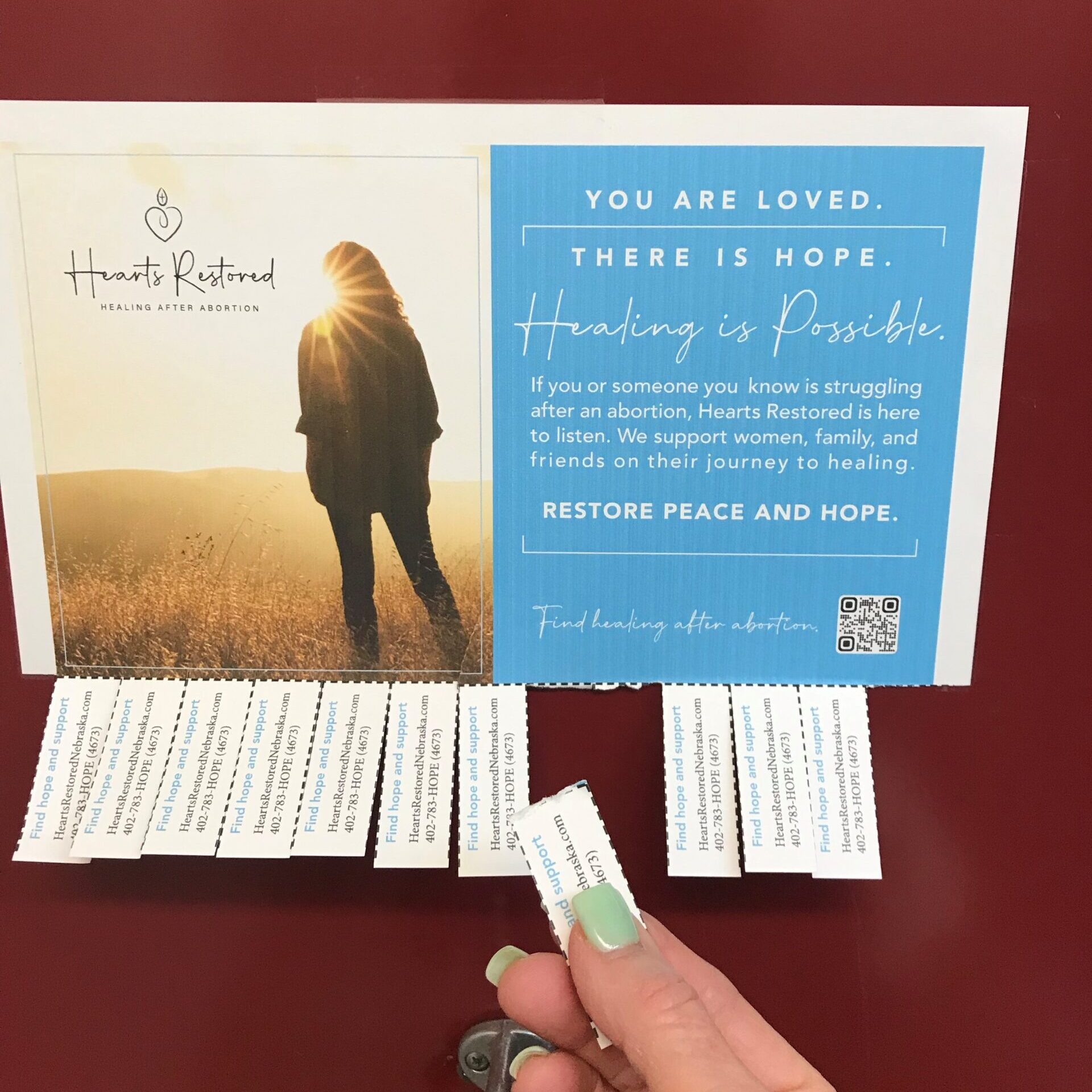
Living Mercy
Unforgivable? No, healing, hope and freedom are available after an abortion
March 22, 2024
‘I just thought I was doomed.’
Heidi was tormented by pain and sadness.
Even the word “abortion” triggered her.
“I’d drive by a billboard, I’d hear it on the radio. … It triggered me all the time,” she said. “It was just getting worse and worse. I was angry, sad.”
Heidi couldn’t escape her past – the two abortions she’d had years earlier – even after she gave birth to two other children.
“I’m a mom raising beautiful little kids and doing my thing, so it was like a split life,” said Heidi, a pseudonym for a Catholic woman in the archdiocese who asked to remain anonymous.
“I mean, it was always there. I never forgot,” she said. “It was just part of something I was never going to get past and would have to live with.”
Then one day, about eight years ago, the Holy Spirit seemed to break through, when a politician on television was talking, saying abortion was a private decision between a woman and her doctor.
“And I just flipped out,” Heidi said. “I just went: “It is not! You just walk into a clinic. There is no discussion!”
“You just make an appointment and go, so what is she talking about? And I just started yelling. It was like, I don’t care what happens to me. I want the world to know that that’s a lie and that this is not good.
“Then this very quiet and clear voice said: ‘Why don’t you get help for yourself first?’
“It never even occurred to me,” Heidi said. “I just thought I was doomed. Really. I was never going to feel better. I had scars. It was never going to be different.”
“So I turned around – I can picture this right now – and I Googled something and Silent No More came up.”
Heidi emailed the organization, which referred her to Rachel’s Vineyard, an international nonprofit that offers faith-oriented, Bible-based weekend retreats where anyone – women or men – can “begin the process of restoration, renewal and healing,” according to Rachel’s Vineyard website.
For Heidi, the retreat was life-changing.
“That retreat just touched and grabbed onto all that grief and sorrow and took it,” she said. “I left there feeling like I was a whole different person. I was set free.”
The United States in 2023 recorded its highest number of abortions in the last decade, with an estimated 1.03 million abortions reported by the Guttmacher Institute, which advocates for abortion. While some women who had an abortion wanted it, surveying done by abortion clinics has underrepresented the amount of regret and negative emotions among that population, according to a 2023 study published in the medical journal Cureus.
Two-thirds of the women surveyed reported that they would have preferred to give birth to their child but said they had an abortion because they felt they didn’t have enough financial or emotional support. Some reported feeling coerced into the decision. These women had a significantly higher rate of being diagnosed with psychological disorders and reported a higher incidence of anxiety, depression and suicidal ideation.
Many who ultimately sought help after their abortion, like Heidi, said they repressed their negative emotions for years or even decades before an event triggered their negative emotions, the study said.
Rachel’s Vineyard is just one option for people who’ve been suffering after an abortion. In 2023, Nebraska’s three Catholic dioceses combined efforts and began a project called Hearts Restored, which leads people to resources to help them find healing, peace and wholeness after an abortion.
People can reach out through a confidential hotline, 402-783-HOPE (4673), or by emailing FindPeace@HeartsRestoredNebraska.com, which has a confidential inbox.
The statewide hotline is managed and overseen by Immaculate Heart of Mary Counseling Center in Lincoln. There a caller would be put in touch with a trained, professional counselor, who would inquire about the caller’s needs and point him or her toward help and resources.
That could be just a phone conversation, free counseling from specially trained licensed therapists, spiritual direction or pastoral counseling, the healing sacraments the Church offers, support groups, a trained mentor to call or meet with, online resources, including a group geared for men, or a retreat like the ones offered by Rachel’s Vineyard.
‘The mercy of God is overabundant and is just a beautiful thing to encounter.’
Callers are pointed “in the best direction to help them begin that healing journey,” said Tom Venzor, executive director of the Nebraska Catholic Conference, which helped launch Hearts Restored.
The new initiative is modeled after Project Rachel, which was organized by the U.S. Conference of Catholic Bishops. But Hearts Restored is unique because it’s a diocesan collaboration between the Archdiocese of Omaha, the Diocese of Lincoln and the Diocese of Grand Island.
Officially rolled out on Oct. 7, Hearts Restored continues to build a network of specialists across Nebraska to provide nearby help for any needs, including telehealth counseling for remote areas.
“So there’s a lot of opportunities out there for healing,” Venzor said.
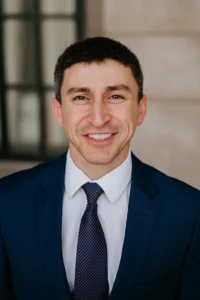
Tom Venzor
It’s important “for a person to know that the mercy of God awaits them,” he said, “and that the mercy of God is overabundant and is just a beautiful thing to encounter. This is just one of the many ways for the Church to reach out to those who need to experience, and want to experience, the mercy of God.”
Those who have been part of an abortion are suffering great pain, said Father Ben Boyd, pro-life chaplain for the archdiocese. “The good news is that the Lord has come, and He has really great healing and freedom for you.”
He said he’s witnessed that freedom, mercy and healing in the confessional and in counseling people. “It’s the result of the Lord’s touch, and it’s something only He can do.”
Father Boyd encouraged those who’ve been traumatized by abortion to get the support they need and to establish a relationship with God. “That freedom is there for any of us. Jesus reminds us we’re not defined by our sin.”
There’s no need to be afraid, he said. “The Lord is very approachable.”
Help through Hearts Restored is open to anyone in need – “regardless of their faith background, women and men, grandparents, other relatives and anyone who has had some role in and/or been impacted by an abortion,” said Courtney Miller, a licensed psychologist and director of clinical services at Immaculate Heart of Mary Counseling Center.
“Often after experiencing an abortion, an individual may have tremendous guilt and shame and feel they have committed an ‘unforgivable act,’” the psychologist said. “Sometimes it is difficult to know where to obtain support after an abortion. It also takes a lot of courage to seek help.”
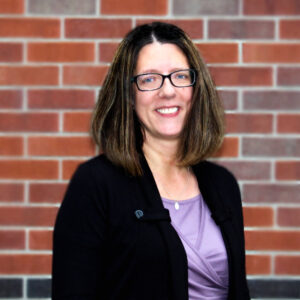
Courtney Miller
A person might desire that help, Miller said, after talking with a supportive friend or loved one, after being made aware of available resources, or after hearing the testimony of someone hurt by abortion who has found healing and hope.
Toni McFadden – a speaker, author and counselor from Hamburg, Pennsylvania – shared her story Feb. 29 in Omaha, at a benefit dinner for Essential Pregnancy Services (EPS).
People approach McFadden “all the time, either after I speak or they’ll write me on social media,” she said. “Because once you’re open, once you’re vulnerable with people about something like this, then they feel like they could be vulnerable, too. It gives them that invitation.”
Often people are afraid that they will be judged because of their abortion history, McFadden said, “and they know I’m not going to judge them because I went through it. So they feel safe.”
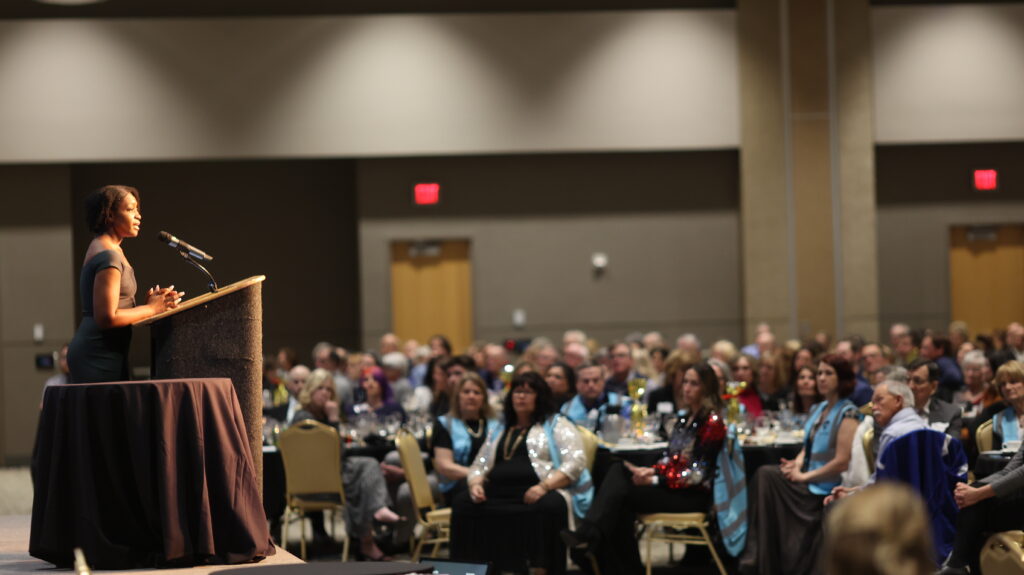
Toni McFadden speaks at a recent fundraiser in Omaha. JOE MIXAN
Though her story is painful, McFadden said, she feels God is calling her to share it. She remembers the lies from the abortion industry that she believed, that abortion is normal, that her life would go back to normal, that as a senior in high school she was too young to be a mother.
She remembers “violently crying” in the back seat of a car on the way home from the abortion clinic because her best friend and boyfriend in the front seat were “just carrying on a conversation as if nothing happened.”
She remembers that the second set of pills in her pill-induced abortion didn’t work, and that about a month and half later she began hemorrhaging at her high school. “I remember my mom coming and picking me up and bringing me home, and I still didn’t tell her. … I just remember going from the bathroom to my bedroom for hours. It could have been days. I don’t even know, but I was in so much pain.”
McFadden said her post-abortion healing began with a Bible study. Now she refers people who’ve been traumatized by abortion to a Bible study, a church or a pregnancy resource center like EPS.
“At EPS we offer grief counseling to women who have chosen abortion, without judgment, and without shame,” said Kerri Gilson, executive director.
“Not only are we there for women who choose life, but we are there for women who don’t,” Gilson said. “At the gala we provided resources in the men’s and women’s bathroom stalls for help after abortion (from Hearts Restored). We know that abortion affects both men and women and we wanted to show them that they are not alone.”
‘He took on our past and future sins.’
McFadden said the main question she gets is “How do I forgive myself?” or “How could God forgive me for this?”
She said she often points to Isaiah 1:18, which says, “Though your sins be like scarlet, they may become white as snow; Though they be red like crimson, they may become white as wool.”
Only God can offer such forgiveness, McFadden said in a phone interview.
“Only He can do that. And when He took on sin (on the Cross),” she said, “He took on our past and future sins. And not only did He take them on, then He defeated them by being resurrected.
“If you don’t stand in that promise and that truth, you’re going to depend on yourself,” McFadden said, and that type of forgiveness “is not something that we can do. It’s only something that God can do.”
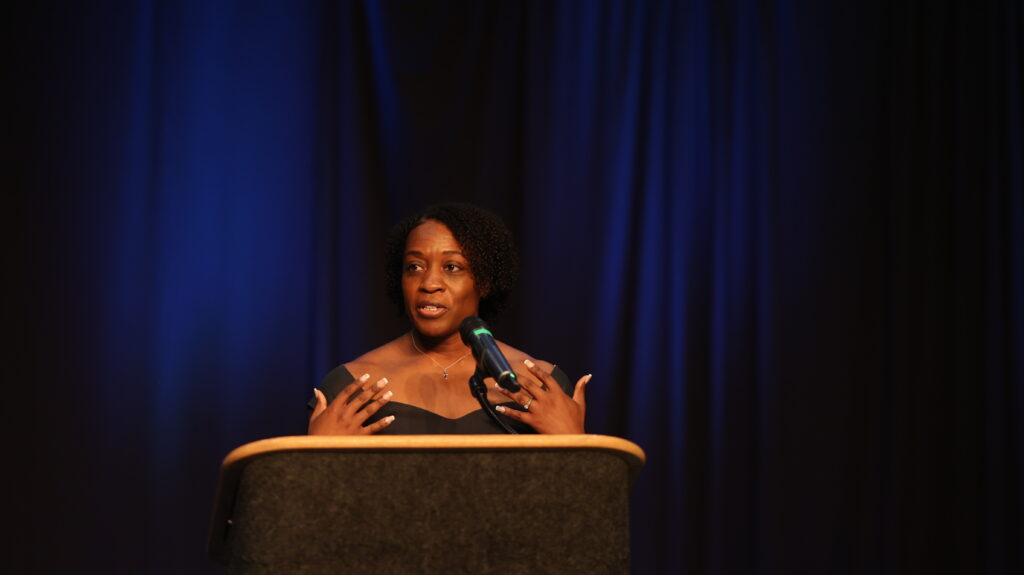
Toni McFadden gives her testimony in Omaha. JOE MIXAN
Understanding the Lord, the God of Mercy, through Scripture helps people heal, she said, “because our trauma can blur those lines of thinking.” Scripture helps “to get the focus off of ourselves and more on Him.”
A therapist and licensed mental health practitioner in Omaha – who preferred to remain anonymous because of fear of retribution – said what she sees most in people who are suffering after an abortion are shame, despair and attempts to suppress their abortion experience.
“The first time a woman might come in, she might say, ‘I’ve never told anyone this before, except my sister or my best friend,’ or ‘You’re the only other person I’ve ever told except the father.’
“So I think there tends to be a lot of isolation and shame,” said the therapist, who helps with Rachel’s Vineyard retreats and is specially trained to help people after an abortion. Also, she said, “There’s this despair that this can’t ever be fixed or changed or resolved in any way.”
After an abortion, many people “try to keep it under wraps,” the therapist said.
“It’s like that beachball that you try to hold underwater, and it just keeps wanting to shoot to the top of the surface.”
Some people resist the truth about abortion and any attempts at healing.
“For instance, a post-abortive woman might throw herself into becoming an activist for pro-choice causes. There’s a lot of people that will go out and picket, and you can kind of see in their eyes that they’re picketing for something that’s very personal to them as if to defend their choice.”
“Then interpersonally, I think, you just see an uptick in the things that people do to numb out their trauma because going through an abortion is a traumatic experience, so they might be prone to overeat or oversex, all of those things that we do to sort of numb out.”
“We see increased use of alcohol, depression, anxiety,” the counselor said. “There’s always the anniversary issues that come up around the date. Perhaps the date they found out they were pregnant or the date that the baby would’ve been born. Mother’s Day is a big trigger for women sometimes.”
Many people feel shame after an abortion, which leads to isolation, she said. “So just being able to talk to somebody about it” helps. That could be a priest, deacon or a counselor trained in helping people after an abortion.
“They would be met with, of course, an understanding and the idea that God’s mercy is there and can cover any sin that is repented.”
At Rachel’s Vineyard retreats, “we’re always focusing on Jesus and what He provides in terms of bringing us back to life.”

Photo by MAYR
The retreats tend to be small, she said, with about seven to nine participants. Rachel’s Vineyard plans to add a Spanish-language retreat this summer.
Post-abortion healing can be complicated, the therapist said, and the retreats are “not a one-and-done thing.”
“Sometimes people might start out with a retreat and then realize, ‘Oh, I have a lot more stuff I need to process,’ and they’ll go to counseling. Or vice versa, they’ll start out in counseling and they’ll realize, ‘Oh, my abortion really is the worst thing that I can’t seem to get through,’ and they’ll come on a retreat. So it kind of works both ways.”
‘Every individual’s story and journey are unique …’
Listening is important in Miller’s job at the Immaculate Heart of Mary Counseling Center and in receiving calls through the Hearts Restored 1-800 number.
“Every individual’s story and journey are unique and the path to healing is not necessarily linear,” she said.
Venzor encourages people to spread the word about the post-abortion healing ministry. “Something like one in four women have experienced abortion and that includes women in our own pews at church,” he said.
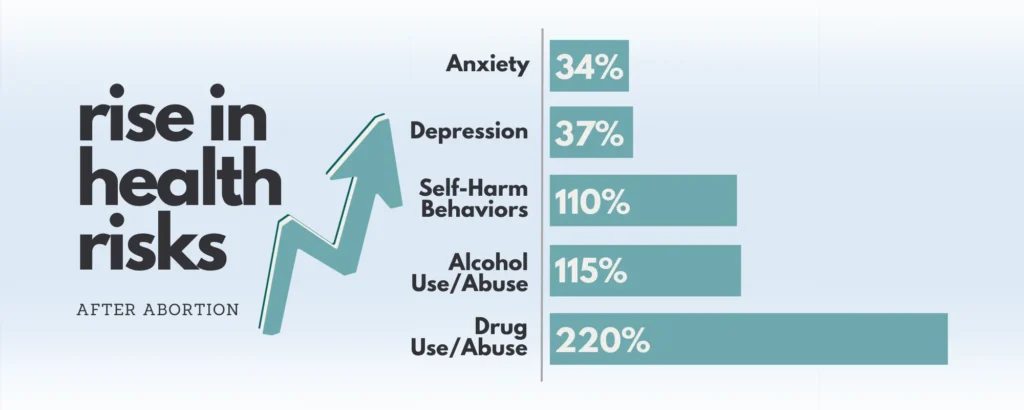
HEARTS RESTORED
“But this is an opportunity to not only extend the message of mercy to people in our own pews, but to people in the community at large to help them understand that abortion can be a traumatic experience and that they shouldn’t just despair. That mercy and healing is always there and available to them.”
“We are called to show compassion and care in support of post-abortion healing and in promoting a culture of life,” Miller said. “Often an individual is in a state of crisis when making a decision to have an abortion. We should open up conversation with anyone suffering from post-abortion (trauma), meet them where they are at and journey with them,” while pointing to resources that will offer them healing and hope.
Witnessing as a Christian means offering charity, dignity and love to those involved in the sin of abortion, Father Boyd said, by inviting them to prayer and a relationship with the Lord. There they can experience His mercy.
God doesn’t want anyone to be burdened, he said.
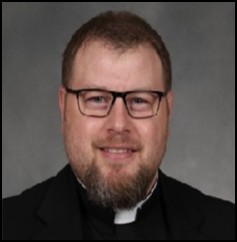
Father Ben Boyd
Being pro-life and fighting to end abortion involves “care and concern for the souls trapped in it, and for even those who perpetuated and promoted it,” Father Boyd said. “They’re still beloved by God. Do they need a conversion of heart? Well, yeah. But we’re not called to be activists. We’re called to walk with people personally with these difficult issues.”
“His mercy and His love, that’s what’s going to change hearts.”
A key part of post-abortion healing ministry is prayer, Venzor said.
“All of our ministries are founded in prayer,” he said, “but this one in particular, it’s a hidden ministry that you never know exactly if the seeds you’re planting are going to take root and if they’re going to bear fruit.
“You’re just praying, and you’re working, and you’re getting the word out there. And you’re just hoping and praying to God that the message gets to the people who need to hear it, and that they act on it.”
Venzor urges people “to pray that those who need post-abortion healing ministry will find it and that they will respond to it, that they’ll know how much they’re loved.”
READ MORE FROM THE CATHOLIC VOICE: